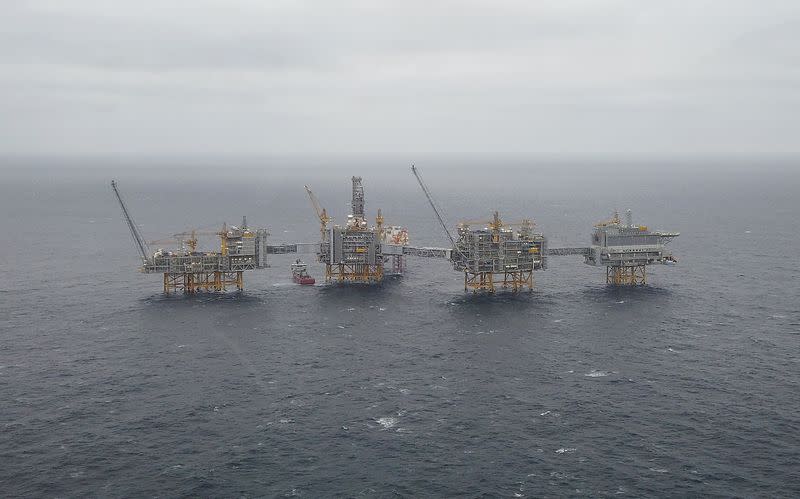Norwegian government proposes overhaul of petroleum tax system
By Nerijus Adomaitis and Nora Buli
OSLO (Reuters) - Norway's government has proposed overhauling taxation of its oil and gas firms by scrapping some incentives, it said in a surprise announcement on Tuesday, further heating up a pre-election debate over the future of the country's top industry.
If passed by parliament, the proposals would remove deductions that some economists say encourage excessive risk-taking by oil firms, and would also cut reimbursements for exploration costs.
"The changes mean that the tax conditions will be tighter and have a more neutral effect on investments. At the same time, we are making sure that companies have predictable framework conditions," Finance Minister Jan Tore Sanner said.
Norway is western Europe's largest oil and gas producer and companies operating on the Norwegian continental shelf include Equinor, Shell, TotalEnergies, ConocoPhillips, as well as Aker BP and Lundin Energy.
Under the proposal, a special tax rate paid by oil firms will effectively be raised to 71.8% from 56% currently, but the overall tax rate would remain at 78%, the finance ministry said.
The proposal would also phase out the reimbursement system for exploration costs, which was introduced in 2005 to reduce financial risk, especially for smaller players, and to encourage exploration.
A SURPRISE DECISION
Parliament last year introduced temporary incentives for oil firms to keep developing reserves amid a plunge in the price of crude during the coronavirus pandemic.
While the move has triggered a flurry of new oil and gas development plans, preserving jobs at industry subcontractors across Norway, it could also pose a risk of overinvestment as costs are shifted from companies to taxpayers.
Equinor , Norway's biggest oil company and majority owned by the state, told Reuters it did not know in advance about the announcement. "Those are extensive changes in the tax regime and we need more time to understand those," company spokesperson Sisel Rinde said.
Some analysts also said the full impact was not immediately clear.
"It looks like it would reduce tax deduction from 89.6% to 78% on investments. How it would affect investments appetite, (that) would depend on the discount rate," Teodor Sveen-Nilsen, an analyst from the Sparebank 1 Markets, told Reuters.
Environmentalists welcomed the proposed tax changes.
"The measures mean the start of a much-needed change away from climate-hostile and unprofitable oil exploration," Frode Pleym, head of Greenpeace Norway, said in an email.
Environmentalists and some opposition parties have called on the government to stop all exploration on the Norwegian continental shelf to reduce greenhouse emissions.
According to the latest opinion polls, the centre-right minority government is set to lose the Sept. 12-13 parliamentary elections, with climate change and the future of Norway's oil and gas industry at the centre of the debate. [nL1N2Q21UD]
The main opposition Labour party, which is set to win the elections, said it needed more time to study the proposals, deputy leader Hadia Tajik told the NTB news agency.
The populist rightwing Progress Party, on which the minority government relies to pass its budgets, said the proposal was "unbelievable".
"With this proposal, I can immediately say that the government will not survive budget talks this autumn," Progress Party leader Sylvi Listhaug told the e24 business website.
($1 = 8.6903 Norwegian crowns)
(Additional reporting by Terje Solsvik and Gwladys Fouche; Editing by David Goodman, Grant McCool and Mark Heinrich)

 Yahoo Finance
Yahoo Finance 

